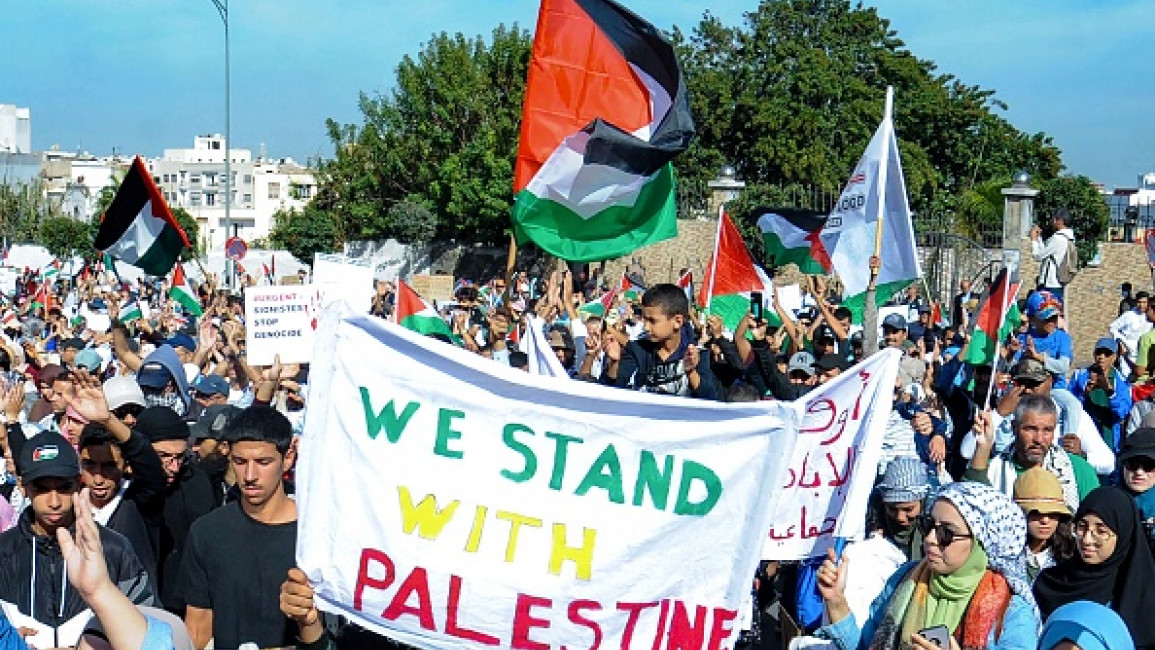Did North African states join global strike for Gaza?
After the United Nations Security Council failed, once again, to pass a binding resolution calling for a ceasefire in Gaza, thousands of workers around the world joined Monday, 11 December, a global strike in solidarity with Palestine.
While some states in the Southwest and North African region transformed into ghost cities, participation in the strike in North Africa took a different path.
Tunisia
In Tunisia, thousands of teachers carried out a two-hour strike from inside the country's schools in protests of the ongoing Israeli genocide in Gaza as they called for an immediate ceasefire.
"With this strike, we are putting pressure on global decision-makers to review their unconditional support for the Zionist entity," Nabil Al-Hawashi, a member of the Tunisian General Labor Union (Teachers Syndicate), told Anadolu agency.
Meanwhile, the students' unions took to Tunis streets chanting, "The people want to liberate Palestine", a chant that was quickly picked up by those passing by in Bourguiba street, with some spontaneously joining the students, according to protesters.
However, most shops in the capital remained open, showing solidarity by sporting a keffiyeh or hanging the Palestinian flag instead of closing their shops.
"It's difficult for us, as you know here (in Tunisia). But our hearts are with our brothers in Palestine," said one of the several shop owners in Tunis who opened their shops on the strike day.
Economists estimate the cost of implementing a general strike in Tunisia's public and private sectors to be about US$150 million.
Morocco
In Rabat, 11 December was just another Monday with overcrowded tramways and delayed trains.
Teachers, renowned for joining such symbolic movements, head to their classrooms on their first day back to work after a two-month-long strike against unfair payment and treatment. Last week, Teachers' Unions agreed with the government and ended the strike.
Throughout the six-week-long strike, teachers faced repercussions, including monthly salary reductions of up to 20%.
"In the absence of the work component, the wage cannot be paid in implementing the Public Accounting Decree," a law implemented by former prime minister Abdelillah Benkirane (2012-2016).
A consequence that discouraged numerous Moroccans from participating in the worldwide strike, especially amid the lack of support from any workers' union for the strike.
"The call for the strike was launched only two days before. It takes time for the trade unions to react to such initiatives, as they are the framing body of the working class," argued Tayeb Madamad, a member of the Moroccan Front against the normalisation, a local Pro-Palestine NGO.
From 1962 until 2011, all six of the North African Kingdom's constitutions stipulated strikes as a guaranteed right. Still, to this day, no regulatory law has been adopted that clarifies its conditions - leaving a broad legal frame for employers to use, sometimes, against their employees.
Algeria
Algeria, a country with brutal laws against labour strikes, did not participate in the global campaign.
The Algerian government officially released a decree prohibiting strikes in about 10 "essential and strategic" domains in October.
The opposition party of peace, which supported the strike, said they respect the state and the law, but "what concerns us more at present is what is happening to our brothers in Gaza. We consider that our destiny and their destiny are one."
Meanwhile, the government did not officially comment or endorse the strike.
Sudan and Libya
Sudan and Libya have also witnessed little to no participation in the strike despite the strong pro-Palestine feelings among their populations as the two states continue to grapple with their own political conflicts and struggling economies.
بيان الكتلة البرلمانية الجزائرية الداعم للإضراب العالمي 11ديسمبر 2023#الاضراب_الشامل #STRIKEFORGAZA pic.twitter.com/75CjJQYLVJ
— Esraa Alshikh إسراء الشيخ (@Esralshikh) December 11, 2023
Last week, the Palestinian National and Islamic Forces issued a call for the strike to include "all aspects of public life" for those across the occupied West Bank and the world.
The hashtag #strikeforgaza has gone viral on X, with over 700k posts. Organisations like the National Lawyers Guild in the US have also taken up the strike.
The Center for Palestine Studies at the School of Oriental and African Studies in London says that the strike will likely need to continue beyond just one day to have a significant enough economic impact to be felt truly.
Some activists are reportedly planning to continue striking in the upcoming days to give people worldwide more time to organise and join the movement.


![Minnesota Tim Walz is working to court Muslim voters. [Getty]](/sites/default/files/styles/image_684x385/public/2169747529.jpeg?h=a5f2f23a&itok=b63Wif2V)




![Debris near Rafic Hariri International Airport [Getty]](/sites/default/files/styles/image_212x120/public/2176162423.jpeg?h=a5f2f23a&itok=XLiO6WHk)
![An Israeli air strike on Jabalia killed teenage journalist Hassan Hamad [Screengrab/X]](/sites/default/files/styles/image_330x185/public/2024-10/hassan%20hamad1.jpg?h=c12e0b96&itok=Rd_dyCVp)
